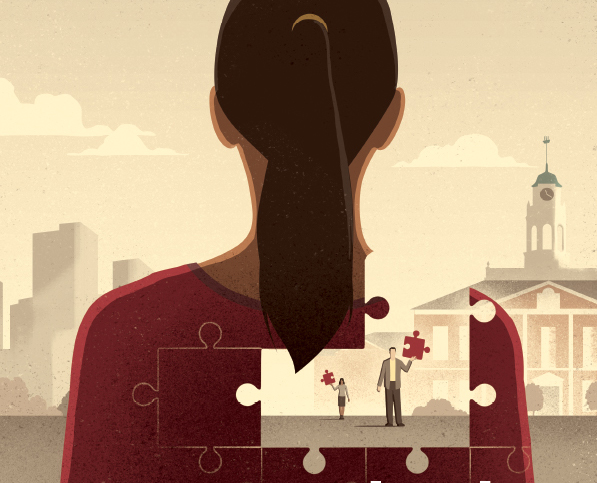It was in a class with History Instructor Leah Merrill ’93 during fall of lower year that Brandes realized “what good writing looks like.” She attributes much of her writing progress to Merrill’s thoughtful comments, which affected Brandes deeply. The research paper from that term holds pride of place in her desk drawer. “I look at that paper and I realize, ‘I can do this. Mrs. Merrill believes in me.’”
Another key to Brandes’ development was the bookending of her work at The Exonian with two religion courses: “Faith and Doubt” in prep year and “Epistemology” in senior fall, both taught by Religion Department Chair Hannah Hofheinz. (Science Instructor John Blackwell co-teaches “Epistemology.”) As her focus on journalism increased, Brandes became acutely aware of the ethics of reporting.
Immersion in the “Epistemology” course readings (a 2,000-year retrospective of knowledge, from Plato and the Western philosophical tradition, to the scientific revolution, postmodernism and modern-day authors), and in particular a 2017 meditation by Math Instructor Jeff Ibbotson on the topic of finding truths, led to a breakthrough. “I realized that I didn’t believe in moral relativism, that I did think that pushing for objectivity was an incredibly important part of journalism … that there are such things as moral truths and that some ways of going about the world are objectively right and objectively wrong,” Brandes explains.
She is well aware of the difficulty of achieving objectivity, “especially in historically white newsrooms,” and feels that the “Epistemology” course had an “immediate impact on my work in journalism, especially because as an editor, ethical decisions are the name of the game.”

Over her years at Exeter, Brandes pushed herself beyond her comfort zone many times and found the “moments of discomfort” to be “some of the biggest moments of growth.”
“The true, amazing part of what we’re doing here is the community we’re in, the people who make it up and the stories they have,” she says. “I think that’s a collective experience that Exonians feel about Exeter: just this tremendous gratitude. You’re not feeling comfortable really until you’re about to leave, because that means that you’re constantly trying to improve yourself while you’re at the Academy.”
For Brandes the “end goal” is “being a listener above everything else, being respectful, regardless of whether or not you agree with the position at hand, and acknowledging the unique context that everybody is in before they enter that Harkness table. … [These] are the moments where the Harkness table becomes the most hard and dangerous, but also the moments where the Harkness table has the most to give back.”
Tradition
All of Exeter’s academic departments share the focus on helping students develop values, identity and purpose, but Hofheinz feels that the Religion Department is exceptionally positioned because of its course catalog, which the department chair compares favorably to that of “any high school or college in terms of the robustness of the offerings and their coherence.” “We get to explore how traditions around the globe throughout time have helped people with that process, not just here now, but everywhere and always,” Hofheinz says. “The wisdom traditions, the religious traditions, the philosophical traditions, ethical traditions, all have massive archives of some of the most committed and beautiful people, writings, artifacts, ideas, dilemmas, puzzles, games: everything that we get to explore with the students and let them experience the possibilities within those different languages. … This allows students different registers into which to enter into this conversation and build on it. What does it mean to live a meaningful life? But also what type? What is meaning? What are you here for? Why are you at all?”
The faculty members of the Religion Department see identity formation as a process, not an outcome. They observe closely and use a variety of techniques to assess how students are progressing along the path of greater self-realization. Ultimately, Hofheinz hopes to see students move toward a state of “coherence” where they are able to achieve authenticity and learn to “hold the whole — contradictions and dilemmas included within [themselves] — and be able to also recognize that other people are doing that as well. … Part of forming yourself is being able to have that coherence.”
“How do I know when they’re doing the work?” Hofheinz asks. “Can they get traction with seeing themselves? Can they get traction with saying not only, ‘This is what it is, but this is why I care.’ Or, ‘This is what I believe, but I see that there are alternatives.’ Or, ‘I used to say this, but I realized that I really said that because that’s what I always heard, and I’m not so sure about that anymore.’ Or, ‘I don’t know.’ … To me that’s one of the greatest successes at the end of a class: when a student says, ‘I don’t know, but I do know that this is a question that I’m interested in.’ … That indicates to me very concretely that they have moved from that immediate, intuitive, sure response that is not yet thought out, and there’s a reflection of the middle years that they’re moving through to becoming more of an autonomous grown-up.”

